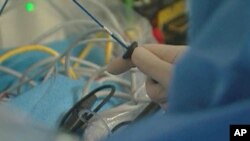A relatively new procedure is proving to be more effective in treating patients with irregular heartbeat than standard drug therapy.
Patients with an abnormal heart rhythm called atrial fibrillation describe their condition the way Robin Drabant does.
"My heart would just start racing, I would kind of lose my breath," she explained. "Usually it only lasted for a couple of seconds, but as I got older, they got progressively worse and more frequent."
Atrial fibrillation can lead to stroke or heart attack. Ray Caspillo says it feels like his heart is flopping out of his chest.
"You feel your chest like it's closing in," he added. "You're gasping for air."
Doctors can treat the condition by threading a catheter around the heart. The procedure is short, and the recovery time minimal.
Dr. David Wilber performs this procedure at Loyola University Medical Center in Illinois.
"Now we're applying radio frequency energy. What that does, is [it] heats up the tissue and destroys that bit of muscle where the catheter is," explained Dr. Wilber. "The goal is to destroy the muscle around the pulmonary veins in order to prevent the transmission of electrical impulses to the rest of the heart."
The procedure is called catheter ablation because it burns off a small amount of heart muscle.
Dr. Wilber and other researchers studied more than 150 patients with atrial fibrillation. About 100 patients had catheter ablation. The others were treated with drugs.
"Sixty and 70 percent of patients treated with catheter ablation never had another episode after the treatment," he stated. "But, about 30 percent did. In contrast, patients treated with drug therapy had somewhere between an 80 and 90 percent recurrence of arrhythmias over that time frame."
Ray Caspillo says having the procedure means he can now walk as much as he wants and without getting tired. Robin Drabant says it was the best decision she has ever made.
"I wish I had made it years before. Because my quality of life is just so much more improved," she said.
Dr. Wilber says catheter ablation is not the first treatment choice for atrial fibrillation. He suggests it only when drug therapy is not working.
The report was published in the Journal of the American Medical Association.
New Drug-Free Treatment Good for Heart Rhythm Problems









